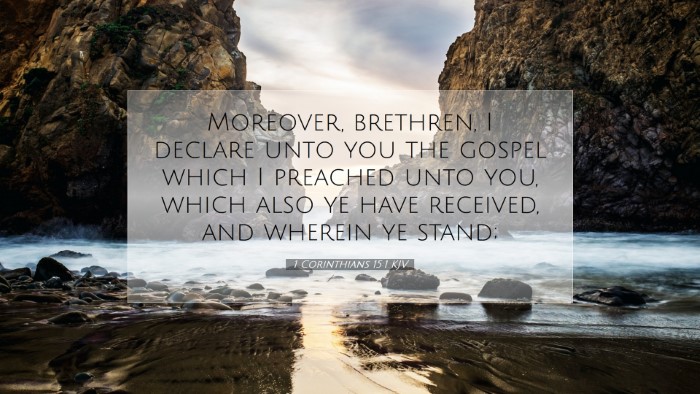Commentary on 1 Corinthians 15:1
Verse Text: "Moreover, brethren, I declare unto you the gospel which I preached unto you, which also ye have received, and wherein ye stand;"
This profound declaration from Paul underscores the importance of the gospel in the life of the believer. In analyzing this verse, we can draw insights from several public domain commentators such as Matthew Henry, Albert Barnes, and Adam Clarke.
Contextual Background
Matthew Henry provides a foundational understanding of the epistle's context, noting that Paul writes to the Corinthian church, a community facing various doctrinal challenges and moral issues. His intention is to reaffirm the gospel's centrality and the believer's position in Christ.
Albert Barnes elucidates that this chapter serves as a pivotal turn in the letter, focusing on the resurrection—a core component of the gospel faith. Paul aims to remind the Corinthians that the gospel is not merely a set of beliefs but an impactful force that shapes their existence.
Exegesis of Key Phrases
The phrase "I declare unto you" indicates Paul's authoritative stance. Adam Clarke notes that declaring the gospel is not just a recitation but a solemn proclamation meant to inspire faith and action among believers. This declaration emphasizes the need for their continuous engagement with the foundational truths of the gospel.
The term "gospel" itself, as Henry explains, encompasses the good news of Jesus Christ's death, burial, and resurrection. It is vital that the Corinthians remember that the gospel is both a message and a transformative power.
Nature of Reception and Standing
Paul's mention of the Corinthians "receiving" the gospel indicates a personal and communal response to the message of Christ. Barnes explicates that reception implies belief and acceptance, placing the Corinthians in a position of faith. It suggests that their standing depends on their active participation in this grace.
Moreover, the phrase "wherein ye stand" indicates stability and firmness in faith. Clarke argues that standing in the gospel implies a steadfastness that is necessary for all believers, especially in the face of trials and challenges. This idea resonates with the theme of perseverance throughout the New Testament.
Implications for the Believer
Matthew Henry emphasizes that recognizing the gospel's central role empowers believers to navigate life's difficulties with hope and assurance. The essence of the gospel fosters a resilient faith that acknowledges past struggles while looking eagerly toward future hope.
- The Collective Identity: The use of "brethren" illustrates a communal identity among believers, calling them to unity in the gospel, reinforcing their relationships based on their shared faith.
- Response to the Gospel: The call to remember their reception of the gospel serves as a reminder to continually engage with its truths; it is an ongoing relationship that should shape their daily lives.
- The Call to Stand Firm: The admonition to stand indicates that spiritual maturity involves confronting challenges with the assurance that comes from faith in Christ.
Theological Reflections
This verse invites profound theological reflection regarding the nature of faith and the importance of doctrine in the life of the church. Albert Barnes highlights that the importance of the resurrection is not merely a historical event but a present reality that believers are called to live out.
Furthermore, Adam Clarke discusses the interconnections between faith, doctrine, and practice, emphasizing that the gospel must penetrate both the mind and heart of the believer, thus transforming their behaviors and actions in accordance with God’s will.
Conclusion
In conclusion, Paul’s proclamation in 1 Corinthians 15:1 serves as an invitation for reflection and commitment to the core tenets of the Christian faith. As Henry, Barnes, and Clarke articulate, the believer's relationship with the gospel is foundational for understanding one's identity in Christ and for engaging courageously in the world.
Pastors, students, theologians, and scholars can draw from this rich commentary to encourage a deeper embrace of the gospel's truths, ensuring that it remains at the forefront of Christian living and ministry.


